Traveling to Greece and looking for travel tips? Looking for things you need to know about Greece before your trip? Are you a solo female traveler going to Greece?
You’ve come to the right place!
This article covers all the essential information you need to know before visiting Greece, especially if you are traveling on our Greece sailing trip.
You can find our Greece packing list in a seperate article at this link.
Brief history of Greece

Ancient Greece is known for its significant contributions to Western civilization, including art, philosophy, science, politics, and literature. There many inventions and thought frameworks still in use today that we owe to Classic Greece.
The history of Greece spans over thousands of years, but here’s a brief overview of its most notable periods:
- Bronze Age (3000-1200 BCE): The earliest Greek civilization is known as the Minoan civilization on the island of Crete, which was followed by the Mycenaean civilization on the mainland.
- Archaic Period (800-500 BCE): This period saw the rise of Greek city-states, or poleis, which were independent city-states that developed their own political, economic, and social systems. Athens and Sparta were two of the most prominent city-states during this period.
- Classical Period (500-323 BCE): This period is considered the height of ancient Greek civilization, The Golden Age of Greece, and is marked by the development of democracy, philosophy, and the arts.
During this period, Athens emerged as the most powerful city-state, both politically and culturally. The Athenian democracy gave power to the people and became the model for many modern democracies.
Famous figures from this time include Plato, Aristotle, Socrates, and Pericles. These philosophers sought to understand the nature of the world, human existence, and the purpose of life, and their ideas continue to influence philosophy today.
In literature, several world famous works were written during this period including the epics of Homer (the Iliad and the Odyssey) and the dramas of Aeschylus, Sophocles, and Euripides
This period saw the rise of powerful city-states and the frequent wars between them. The most famous conflict of this period was the Peloponnesian War (431-404 BCE) between Athens and Sparta, which ultimately resulted in the decline of Athens and the rise of Macedon under the leadership of Alexander the Great.
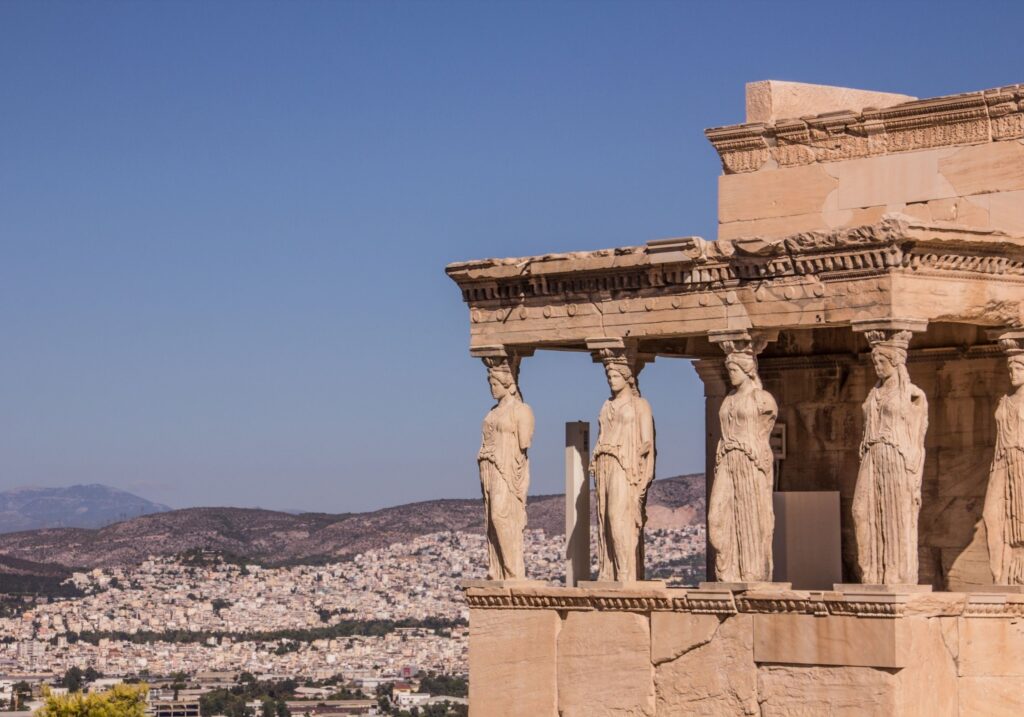
- Hellenistic Period (323-31 BCE): Following the death of Alexander the Great, the Greek world became fragmented, and the Hellenistic period saw the rise of new kingdoms and dynasties.
The Hellenistic period saw the spread of Greek culture throughout the region, in cities such as Alexandria in Egypt.
The Hellenistic period also saw the rise of new schools of philosophy, such as Stoicism and Epicureanism, which offered different ways of thinking about the world and human existence. These philosophies focused on personal ethics and individual happiness, rather than abstract theories of knowledge.
This was a time of political turmoil, as various kingdoms vied for power and territory. One of the most powerful Hellenistic kingdoms was the Ptolemaic dynasty in Egypt, which was known for its wealth and grandeur. The last ruler of this dynasty was the famous queen Cleopatra, who was known for her beauty and political savvy.
- Roman Occupation (146 BCE – 395 CE): Greece became part of the Roman Empire in 146 BCE after the Roman conquest of Greece. The Romans heavily influenced Greek culture and architecture, and this influence can still be seen throughout the country today.
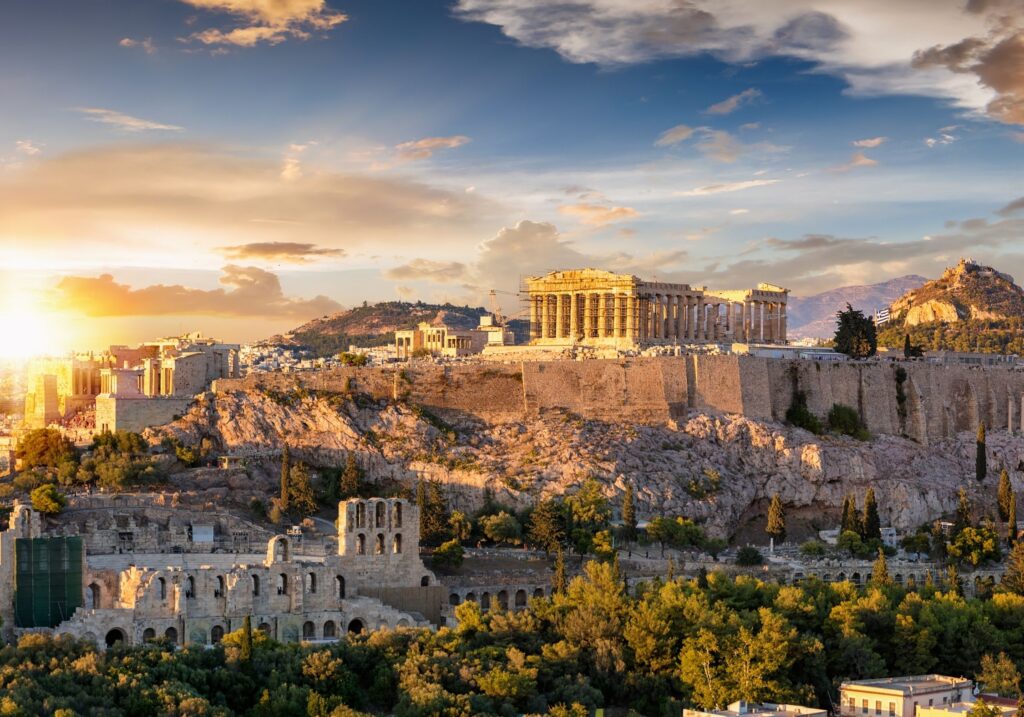
- Byzantine Period (395-1453 CE): After the fall of the Western Roman Empire, Greece became part of the Byzantine Empire which lasted until the fall of Constantinople (Modern day Istanbul) to the Ottoman Turks in 1453 CE.
The Byzantine Empire was a predominantly Greek-speaking, Christian state that was heavily influenced by Roman law, culture, and institutions. It was a powerful and prosperous empire that controlled much of the eastern Mediterranean, including Greece, Asia Minor, Syria, and Egypt.
The Empire was famous for its exquisite art and architecture, including the iconic Hagia Sophia in Constantinople, which is now a museum. Byzantine art was characterized by its use of intricate mosaics, gold leaf, and vibrant colors, and it influenced the development of art throughout Europe.
- Ottoman Occupation (1453-1821 CE): In 1453, the Ottoman Empire conquered Constantinople, and Greece became part of the Ottoman Empire until the Greek War of Independence in 1821.
The Ottomans ruled Greece through a system of local administrators, or beys, who had considerable autonomy in governing their regions. The Greek Orthodox Church also played a significant role in the lives of the Greek people, and it acted as a focal point for Greek cultural identity.
The Greek War of Independence lasted until 1832 and was a popular uprising against Ottoman rule with the involvement of foreign powers such as Russia, France, and the United Kingdom. It ultimately led to the establishment of an independent Greek state in 1832, with the support of the major European powers.
The legacy of ancient Greece can still be seen today in various aspects of Western culture, from democracy and philosophy to art and literature.
On a trip through Greece, you will be able to appreciate the various historical periods and see how its culture and traditions evolved. The country’s history is also reflected in its cuisine which has Turkish, Italian and Mediterranean influences.
Quick facts about Greece

- Greece is known as the “cradle of Western civilisation” as it is the birthplace of democracy, philosophy, literature, theatre, and the Olympic Games. The world’s first recorded Olympic Games were held in Greece in 776 BCE, and they were held every four years until 393 CE.
- The Greeks invented the alarm clock in the 3rd century BCE. It was a water clock that would sound an alarm when the water level dropped to a certain level.
- Greece has more archaeological museums than any other country in the world, with over 100 museums dedicated to ancient history.
- The Greek alphabet is the oldest continuously used alphabet in the world, with a history that dates back over 2,500 years. The Greek language has been spoken for over 3,000 years, making it one of the oldest languages in the world.
- The Greeks are known for their love of food, and the country has a rich culinary tradition that includes dishes like moussaka, souvlaki, and tzatziki. The country is the third-largest producer of olive oil in the world, after Spain and Italy and is home to one of the world’s oldest wine-producing regions and oldest vineyards (in Santorini), with a history of winemaking dating back over 6,500 years.
- Greece is home to the longest coastline in Europe, stretching over 13,600 kilometers (8,500 miles), and over 2,000 islands, but only around 170 of them are inhabited.
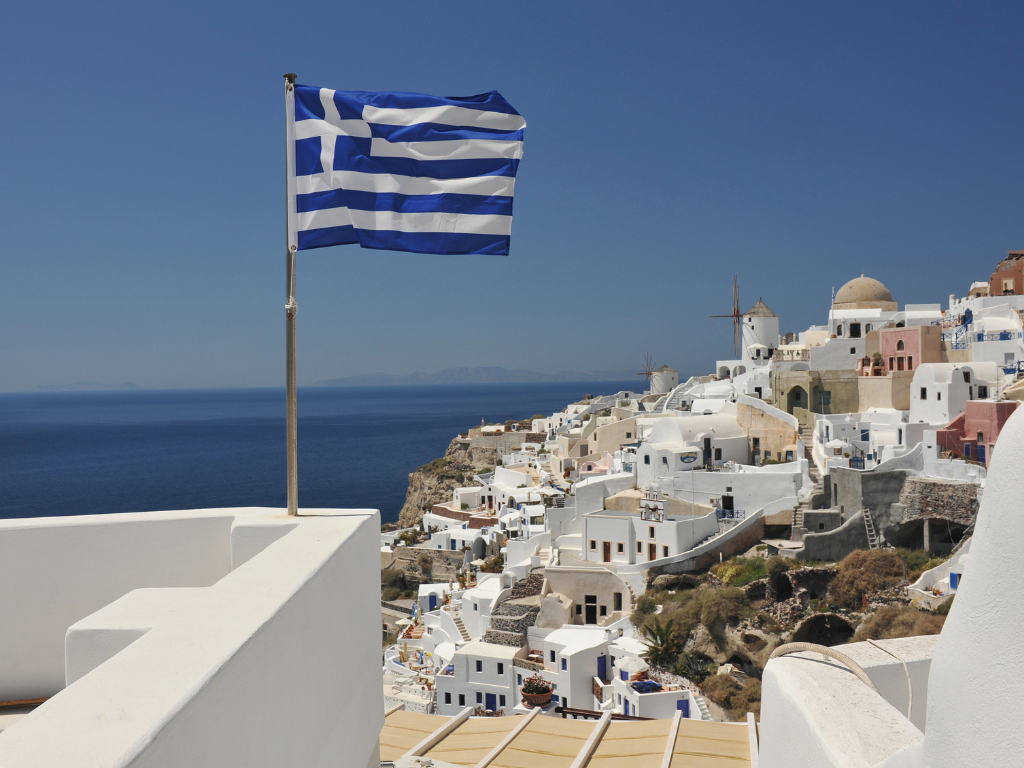
- The ancient Greeks believed that Mount Olympus was the home of the gods and goddesses, and it is still considered a sacred place in modern-day Greece. They also believed that the god Zeus created the first woman, Pandora, as a punishment for mankind. According to the myth, Pandora opened a jar (not a box) that released all the evils of the world, but also hope. The God Apollo was responsible for bringing the sun up every day, and he was also the god of music, poetry, and prophecy.
- Greece has a long history of producing some of the world’s greatest thinkers, including Aristotle, Plato, and Socrates. However, they also believed that the world was flat and circular, with Greece at the center of the world.
- The Greek flag is made up of nine horizontal stripes of blue and white, representing the country’s nine syllables in the phrase “Ελευθερία ή Θάνατος” (Eleutheria i thanatos), meaning “Freedom or Death”.
- The Greek island of Crete is home to the longest gorge in Europe, the Samaria Gorge, which stretches over 16 kilometers (10 miles) and is a popular hiking destination. It is also home to the world’s deepest underwater cave, the Vouliagmeni Cave, which is over 150 meters (492 feet) deep.
- Greece has a very high number of sunny days, with an average of over 250 sunny days per year.
- Santorini is a volcanic island located in the Aegean Sea, and it was formed by a volcanic eruption that occurred over 3,500 years ago. Its name comes from the Venetian name “Santa Irene,” which was given to the island after the Venetians took control of it in the 13th century.
Greece travel tips
In this section we want to share general Greece travel tips to help you plan your trip.
When to visit Greece

Greece could be a year-round destination thanks to its mild weather. However, many of the islands are seasonal and close during the winter (November to April), so you should be careful if you decide to travel in the low season as you could end up somewhere entirely closed off.
On the other hand, the peak summer months of July and August can be extremely hot (40 C or 100 F), absolutely crowded and expensive. This leads to some of the islands being booked out months in advance and prices sitting at twice the shoulder season prices.
June and September have historically been the preferred months for those who want to avoid the summer rush, but are quickly becoming equally as busy (if not more). As a result, May and October are fast becoming the new popular times to visit Greece, even though the weather can be chillier (beginning of May and end of October).
When deciding when to visit Greece, it is also important to bear in mind the wind. Some island groups such as the famous Cycladic islands (Mykonos, Santorini, Paros), get their name from the wind which blows strongest in August.
While this may seem like a good time to visit to enjoy the sea breeze (and beat the high temperatures), the strong winds can often disturb ferry schedules and be quite unpleasant when constantly blowing, so it is something to bear in mind.
So when is the best time to visit Greece? It really depends on what you want from your experience, but below is a cheat sheet:
Peak months to visit Greece: Mid June to mid September, everything is expensive, booked early, crowded and hot. Parties abound.
Off-peak months to visit Greece: November to April. You need to be careful where you go because many of the popular tourist islands are completely closed off (Santorini, Mykonos, Paros, etc.) so you are better off going to Athens or the year-round islands that have permanent villages and population rather than the eminently tourist islands where everything revolves around visitors.
Shoulder months to visit Greece: Mid April to mid June and mid September to mid October. Towards the end of October businesses start to close down and islands become quieter. The weather can be unpredictable too (rain, hail, strong winds)
Where to go in Greece
Greece is full of wonders and there is so much to see that it is often hard to narrow down the options and the popular and well known destinations win thanks to notoriety in the media.
To help you choose, below are some of the best places to visit in Greece.

- Athens: The capital city of Greece is home to some of the world’s most iconic ancient sites, including the Acropolis, the Parthenon, and the Ancient Agora. The National Archaeological Museum is one of the largest and most important museums in the world, and packed full of ancient Greek art and artefacts.
Athens is the gateway to the islands and the best place in Greece to visit in winter, when temperatures are milder than elsewhere on the European continent. While most visitors head straight out to the islands, the capital is a welcoming change of pace.
Wander through the Plaka district, a charming neighborhood with narrow streets and traditional houses, and enjoy the local tavernas and souvenir shops. See the changing of the guard ceremony at the Tomb of the Unknown Soldier in Syntagma Square, a solemn and impressive display.

- Meteora: A unique and breathtaking destination in Greece, famous for its collection of Eastern Orthodox monasteries perched on top of towering rock formations. The six remaining monasteries are over 600 years old and are listed as a UNESCO World Heritage Site.
The dramatic landscape offers stunning views, and you can hike up to the monasteries or take a guided tour. This is also a popular destination for photography, and many travelers come to capture the otherworldly landscape at sunrise or sunset.

- Santorini: This beautiful island is known for its white-washed buildings, blue domes, and stunning sunsets. It is located at the edge of an extinguished caldera and has become a magnet for 5* hotels and celebrities flocking to its fashionable bars and restaurants with sunset views.
- Delphi: This ancient site was once considered the center of the world, and it is home to the Temple of Apollo and the Oracle of Delphi.

- Mykonos: Mykonos is a beautiful Greek island located in the Aegean Sea. It is known for its stunning beaches, picturesque white-washed buildings, and vibrant nightlife. The island has a rich history and cultural heritage, which is reflected in its architecture and landmarks such as the windmills, Little Venice, and the Church of Panagia Paraportiani.
This island is famous for its vibrant nightlife, picturesque beaches, and charming town center. It is a party destination filled with fashion boutiques and the who’s who of the tabloids. Mykonos is also a favorite LGBTQI+ destination and has become famous for its beach clubs.

- Crete: The largest island in Greece is home to stunning beaches, impressive mountain ranges, and ancient ruins.
This is one of the few year-round islands with a permanent population and it has a rich and diverse history, with evidence of human settlement dating back to the Neolithic era.
The island was also home to the Minoan civilisation, one of the oldest and most advanced in Europe, which flourished from around 2600 BC to 1400 BC.

- Corfu: Corfu is a beautiful Greek island located in the Ionian Sea. It is known for its stunning beaches, crystal clear waters, and lush green landscapes. The island has a rich history and cultural heritage, which is reflected in its architecture and landmarks such as the Old Fortress, the Liston, and the Achilleion Palace.
Corfu Town is a UNESCO World Heritage site and is home to numerous museums, churches, and galleries. Visitors can enjoy a variety of outdoor activities, including hiking, cycling, and water sports. The island’s cuisine is also a highlight, featuring delicious local specialties like moussaka, tzatziki, and fresh seafood.
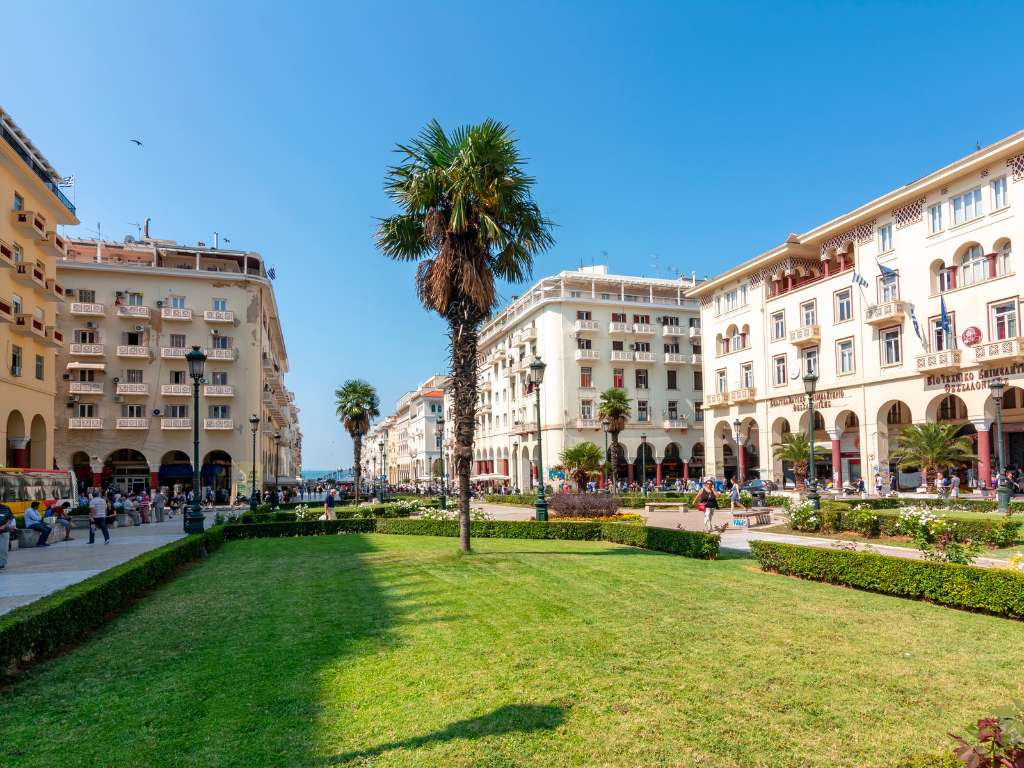
- Thessaloniki: Thessaloniki is the second-largest city in Greece, located on the northern coast of the Aegean Sea. It is a vibrant and lively city with a rich history and cultural heritage.
You can explore the many archaeological sites and monuments, such as the White Tower, the Arch of Galerius, and the Rotunda and the UNESCO World Heritage site of the Hagia Sophia.
The city is famous for its cuisine, with many traditional Greek tavernas serving delicious dishes such as souvlaki and moussaka, and is also a popular destination for shopping, with many boutiques, markets, and malls to explore.

- Peloponnese: This southern peninsula is connected to the mainland by the Isthmus of Corinth and home to some of Greece’s most impressive ancient sites, including the ruins of the ancient city of Mycenae, the ancient theater of Epidaurus and the fortress town of Monemvasia.
Peloponnese is also known for its beautiful beaches, stunning mountains, and picturesque villages. You can enjoy a range of outdoor activities, including hiking, cycling, and water sports. The region is also famous for its wine and olive oil production, with many vineyards and olive groves to explore.
- Zakynthos: This island is known for its crystal-clear waters, stunning beaches, and the iconic Navagio Beach, also known as Shipwreck Beach.
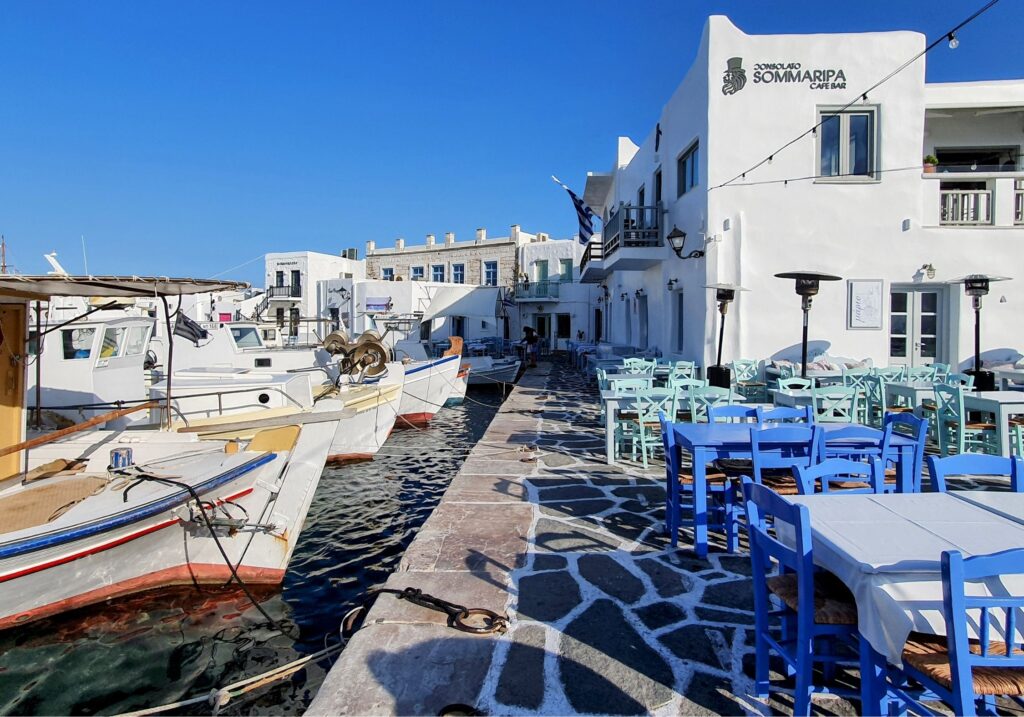
- Paros: Paros is a beautiful Greek island located in the Aegean Sea. It is known for its stunning beaches, olive oil groves, crystal clear waters, and picturesque fishing villages.
The island has a rich history and cultural heritage, which is reflected in its architecture and landmarks such as the Panagia Ekatontapiliani church, the Frankish Castle, and the ancient quarries of Marathi.
You can enjoy a range of activities, including sunbathing, swimming, and water sports during the day, while the nightlife offers a variety of bars, clubs, and restaurants. Paros is also famous for its traditional character, attracting visitors who want to experience authentic Greek island life away from nearby Mykonos that has become very commercialised. The island is a popular destination for families, couples, and solo travelers alike.

- Tinos: This charming Greek island located in the Aegean Sea, known for its beautiful landscapes, stunning beaches, and rich cultural heritage was named one of the best islands in the world by Travel & Leisure and has since been put on the map.
The island is home to the famous Church of Panagia Evangelistria, which attracts thousands of pilgrims every year. You can also explore the many traditional villages, including Pyrgos, which is known for its marble craftsmen.
Tinos is also famous for its cuisine, with many local specialties such as louza, a cured pork delicacy, and artichokes, and is quickly becoming a popular destination for those seeking a more laid-back, authentic Greek island experience.
Passport and visa requirements for Greece
Greece is part of the Schengen Area, a visa-free zone that includes most Western and northern European countries making up a population of over 420 million people.
Within the zone, there is freedom of movement for people and goods; this means that passports are not required because all borders have been lifted, but the external borders of the union are more strict.
In the case of Greece, all its borders with neighbouring countries (Albania, North Macedonia, Turkey and Bulgaria) are non-Schengen borders.
- Visa. Most travelers to Greece do not need a visa. You can check the list of nationalities who do here.
If you need a visa, you will need to obtain a Schengen visa which will allow you to travel for 90 days within a 180 day period in the Schengen zone but typically, your visa application needs to be for the first country you will be landing at.
While the general process is similar for all countries within the zone, the requirements do change and can take weeks to process so allow enough time for this. If you are unsure about the visa application process you can use a service such as iVisa to do it for you.
- Validity. Your passport should be issued in the last 10 years and valid for at least 3 months after your planned date of departure from Greece.
- Onward travel: In order to be allowed into Greece, you may be asked to produce proof of onward flight and / or enough funds for the duration of your stay.
Health and safety

Nobody wants to get sick when on vacation but, if the worst is to happen, it pays to be prepared.
- Bring all the medication you’ll need. During your trip to Greece you will typically never be too far from an urban center, a doctor, a hospital and a pharmacy, but it is still strongly recommended to bring any prescription medication you may need and enough of it to last you the entire trip.
Your specific medication may not exist in Greece, or it may require a prescription you need to see a doctor for, so save yourself time and hassle by bringing everything you may need with you. Review what you should bring in your first aid kit here.
IMPORTANT: Some prescribed and over-the-counter medicines available in your country, including medication containing codeine, are considered controlled substances in Greece. A doctor’s prescription is required in all cases, which should mention your details, the types of medicine and the condition treated. On arrival, Greek Customs may in some cases require you to obtain permission from the Greek National Organisation of Medicines – if you need to carry more than the permitted number of boxes, for example. The National Organisation of Medicines examines these requests on a case by case basis. For more information on controlled medicines, contact the Greek National Organisation of Medicines (telephone: 0030 213 2040 285 / 307 / 225, open Monday to Friday, 12pm to 3pm Greece time, or email: [email protected]).
- Get that coverage. We never leave the house without purchasing extensive medical and travel insurance coverage and this is why we make it mandatory to join our tours. You should make sure that you have adequate medical insurance to cover any unforeseen medical expenses.
Unexpected accidents do happen, and if you needed to be evacuated back home with an injury, the medical bill could bankrupt you.
The best travel insurance will differ for each traveler, depending on the nature, style, and length of your trip, so we recommend using an aggregator and comparison tool such as Travel Insurance Masters to find the right one for you depending on what coverage you want, age, location, trip, etc.
- In case of emergency. 112 is the emergency services number for medical help.
- Tap water. Generally, tap water should be safe for drinking but you should always double check, especially if you are staying in the countryside.
- Passport copies. All hotels and accommodation providers are required by law to register you with the local authorities and for that, they need to take a picture of your passport so don’t be alarmed if they do.
Safety in Greece for solo female travelers

Greece is a generally very safe country to travel to. However, in popular tourist areas or attractions, pickpockets operate and have become quite smart and elaborate in their scams and theft operations.
Always keep your valuables safe and your bag in the front and zipped. Slash and theft proof cross-body bags like the ones we listed on this article are a great idea, and in crowded areas, keep your arm on your bag’s zipper for extra protection.
If something is to happen to you, you will most likely not even notice, but look out for situations in which anyone is trying to distract you by trying to sell you something, talking to you or drawing your attention to anything while a partner steals your wallet or phone. Read our full article on safety tips here.
Basic Greek words

The Greek alphabet is an ancient writing system used by the Greeks since the 8th century BC. It consists of 24 letters, including both vowels and consonants, and has been the basis for many other writing systems, including the Cyrillic and Latin alphabets.
The Greek alphabet has had a profound impact on the development of Western culture and language, and its legacy can be seen in many aspects of modern society, from the names of fraternities and sororities to the symbols used in scientific notation.
It is widely recognized for its use in the sciences, particularly mathematics, physics, and chemistry. It has also been used in the arts, literature, and philosophy, with notable examples including the works of Homer, Plato, and Aristotle.
While most people in tourist areas speak English and you won’t need to know Greek to travel in the country, it’s nice to know a few words.
- Χαίρετε (chéri-te) – Hello
- Ευχαριστώ (ef-ha-ris-tó) – Thank you
- Ναί (né) – Yes
- Όχι (óchi) – No
- Γεια σας (yia sas) – Goodbye
- Παρακαλώ (pa-ra-ka-ló) – Please
- Συγγνώμη (sin-gnó-mi) – Sorry
- Καλημέρα (ka-li-mé-ra) – Good morning
- Καλησπέρα (ka-li-spé-ra) – Good evening
- Θάλασσα (thá-las-sa) – Sea
- ο λογαριασμός (o lo-ga-rias-mós) – The bill
Getting to and around Greece

Most solo female travelers will arrive in Greece by air, sea (cruises, ferries) or by car from neighbouring countries (Albania, Turkey, Bulgaria). They will get around the islands by either car (mainland) or by a combination of ferry and flights.
In this section we will take a look at some of the travel tips for getting to and around Greece.
Getting to Greece
Athens is the largest international airport followed by Thessaloniki Airport, but there are also popular international airports in Crete (Heraklion and Chania), Corfu, the Cyclades (Mykonos, and Santorini with seasonal flights in the summer), Kos, Skiathos, Kefalonia and Rhodes in the southeast of Greece near Turkey. Domestic flights connect many of the local islands between each other and with Athens.
The local airlines are Aegean Airlines and Olympic Air and both cover international and domestic flights. Air France, KLM, Virgin Atlantic, Delta, American Airlines, Finnair, Iberia and British Airways all fly non-stop to Greece in addition to many European low-cost airlines such as Vueling, Ryanair, Wizz Air, Easyjet, etc.
If you plan to drive into Greece, remember that all the country borders are non-Schengen and therefore, you will need your passport to go through as there is an actual border.
Lastly, you can also arrive in Greece by ferry from Italy to Corfu but not to Crete, Santorini, Mykonos, or any of the islands in the Cyclades.
Getting around Greece
Ferries are the main mode of transportation between the islands and run frequently during the summer months but can drop down to one a day or less in winter.
It pays to check the ferry schedules when planning your trip top Greece. Generally, consider that you’ll need time to get to / from the ferry terminal / port, embark and disembark, and account for delays. For this reason, you should count on wasting half a day every time you need to change island and plan at least 2 nights at each.
As ferries depend on the weather and in particular, the winds, to make the journeys. On days with too much wind or large waves (eg. in the Cyclades island which get their name from the wind), delays and cancellations are common. Download the Marine traffic app to track the position of your ferry and anticipate delays
Buses are the other way to get around Greece. Most of the lines are run by the semi monopoly olive-painted company Ktel which connects most of the main cities. You can find out more about how buses work here. The main Ktel website is this.
Alternatively, book a group tour like ours so that you hit the main tourist spots and then some more and have an authentic time. Our Greek island sailing tour hits all the main islands in the Cyclades plus a few lesser known and off the beaten path ones and stops at some magnificent swimming spots only accessible by boat.
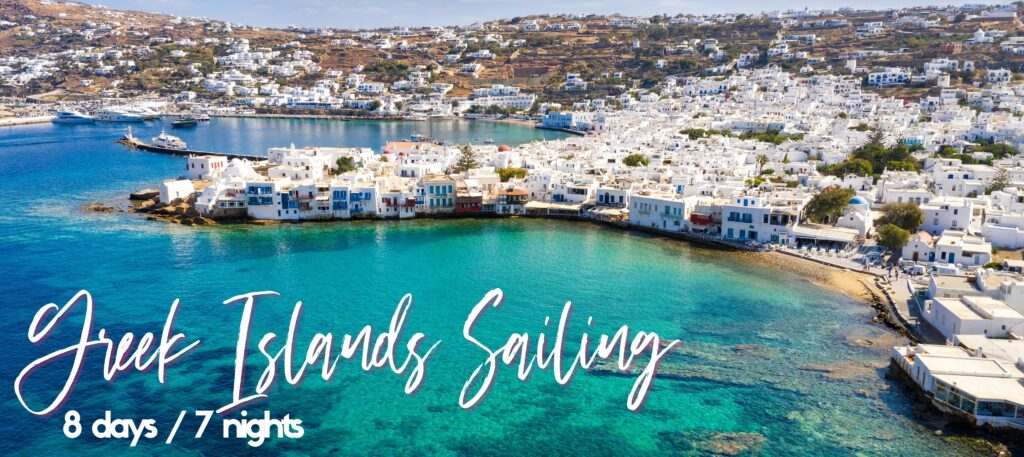
Essentials when traveling to Greece
In this section we will look at a range of other things to consider when traveling to Greece as a solo female traveler.
- Public holidays. Greece has several public holidays and during these days, and on Sundays, most businesses will be closed, this means attractions such as museums may not be open. Plan around the most important ones such as New Year’s Day (1st January), Orthodox Christmas Eve (6th January), Good Friday, Orthodox Easter Monday and Ash Monday (changing every year), Greek Independence Day (15th March), Labour Day (1st May), Independence Day (21st May), Pentecost and Whit Monday (changing every year), God’s mother (15th August), Ohi day (28th October), Christmas Day (25th December) and second Christmas Day (26th December).
- Air conditioning. It can be really hot in the summer months in Greece yet many places don’t have AC. All the hotels and villas we stay at have air conditioning units but it is always worth checking in advance, especially in private homes.
- Staying connected. Public free WiFi hotspots are easy to find but if you want to be connected all the time, explore roaming options with your home mobile provider or get a local SIM card at the airport or in town.
Make sure your phone is unlocked so that a foreign SIM card will work, and get the store staff to help you set up the new SIM card before leaving the shop so they can help you with any settings that need changing.
- Dual voltage. Many small and older appliances that you may use back home may not work in Greece (or other European countries). This is because the voltage is not the same. If you have an old appliance, consider leaving it home, most hotels have hair dryers.
- Plugs. Greece uses the standard mainland European plug with two round pins.
- Wear the right shoes: Most Greece islands and all the archeological sites are ancient and were built hundreds of years ago, this means they are rocky, made of cobblestones and polished over centuries.
This means wearing the right shows is essential to be comfortable in all your exploration and avoid any sprained or twisted ankle. Really flat sandals with no support may become quite uncomfortable after a while and slippery on the shinny stones.
Closed shoes are a good idea in archeological sites like Delos or the Acropolis which are dusty and pebbley. Many of Greece’s beaches are rocky and made of pebbles, not all are sandy, so water shoes come in handy.
For more travel tips, check out these useful travel apps.
Money and currency
Greece uses the EURO and no other currency will be accepted.
ATMs are available in major cities and at airports and I recommend you bring cash as well as credit cards because, while they are widely available, smaller purchases and tips can only be paid for in cash.
Local culture and customs

It is always important to learn more about the culture and customs of a place you visit, not only so that you don’t offend the locals but also so that you can learn more about it and gain the perspective that travel is most valuable for.
In this section, I want to talk about the various local customs and cultural norms that are worth noting when visiting Greece.
- Kissing on the cheek: Greeks often greet each other with a kiss on each cheek, even if they are meeting for the first time.
- Religion: Greece is a predominantly Orthodox Christian country, and religion plays an important role in daily life. Many customs and traditions are tied to religious holidays and events. For example, street festivals, or “panigyria,” are held in honor of a saint or other religious figure and include music, dancing, and food.
- Siesta: The tradition of taking a midday siesta, or “mesimeri,” is still common in many parts of Greece. Many shops and businesses close for a few hours in the afternoon to allow employees to rest.
- Family: Family is highly valued in Greek culture, and it is common for extended family members to live near each other and have regular gatherings and celebrations. This also means that Greeks have a deep respect for their elders, and it is customary to address them with formal titles such as “Yiayia” (grandmother) or “Pappou” (grandfather).
- Dress appropriately. Even when the weather is hot, shoulders and knees should be covered inside churches and religious buildings so a shawl or scarf can come in handy.
- Dancing: Greeks love to dance, and traditional Greek dances are a popular part of celebrations and festivals. The most well-known is the “sirtaki,” made famous by the movie “Zorba the Greek.”
- Worry beads: Greeks often carry worry beads, or “komboloi,” and use them to relieve stress or pass the time. It is a common sight to see people in Greece twirling their worry beads while sitting at a café or waiting for a bus.
- Evil eye: The belief in the evil eye, or “mati,” is still prevalent in Greece. It is thought to be a curse brought on by jealousy or envy, and many Greeks wear charms or amulets to protect against it.
- Naturist beaches. There are a quite a few naturist and nudist beaches in Greece and topless is legal though not common among the locals. Some of the most famous nudist beaches are Plaka in Naxos, Vlychada in Santorini, Glyfada in Corfu, Red Beach in Crete and Paradise Beach on Mykonos.
- Name days: In Greece, name days are celebrated instead of birthdays. Each name is associated with a particular saint, and on that saint’s day, people with that name celebrate with friends and family.
Tipping

Tipping in Greece isn’t customary but it will be welcomed at bars, cafes and restaurants. Below some guidelines to consider:
- Restaurants: Tipping in restaurants is common in Greece, and the typical amount is 10% of the total bill. If the service was exceptional, you may consider leaving a slightly larger tip.
- Bars and cafes: Tipping in bars and cafes is not expected, but it is appreciated. You can leave a small tip of a few cents to a euro or round up to the nearest euro.
- Taxis: Tipping taxi drivers is not mandatory, but rounding up to the nearest euro is a common practice.
- Hotels: Tipping hotel staff, such as housekeeping, is not mandatory, but leaving a small amount of 1-2 euros per day is customary.
- Hairdressers, spas and beauty salons: Tipping hairdressers and beauty salon staff is also common, and the typical amount is 10% of the total cost.
- Tour guides: Depending on the service level and the duration of your tour, you could consider giving 5-10% in tip.
As tipping is always done in cash, mostly in coins since the lowest Euro bill is 5 EUR, it’s important to carry enough 1 and 2 EUR coins with you.
You should leave the tip with the bill or tell the staff to keep the change (e.g. if you give a 50 EUR note for a 47 EUR bill). Credit card machines don’t have a way to add a tip and you won’t be able to add it to the bill when paying by card.
On our sailing cruise, tipping of around 15 EUR per person per day for the crew is recommended and about 10 EUR per the lead guide / host.
Local cuisine
Greece is famous for its cuisine and food which shows influences from across the Mediterranean and Middle East thanks to its rich heritage and history of invasion and cultural blending.
As an eminently Mediterranean cuisine, Greek dishes are based on fresh fruits and vegetables cooked with simple techniques using lots of olive oil, fresh herbs and lots of fish.
Eating in Greece – What to expect

Greek cuisine is known for its fresh, simple and flavorful ingredients, including olive oil, lemon, herbs, and vegetables that are seasonal in nature.
Salads and dips are very popular and often served as sharing dishes in smaller portions and with breads. Seafood and grilled meat are both plentiful in Greece. Desserts often feature phyllo pastry, honey, and nuts, with baklava being a well-known example.
The best meals in Greece are enjoyed in tavernas and other local restaurants with views and right by the water, with freshly caught fish cooked simply on a grill. Pick a nice terrace in the warmer months, and watch the world go by as you enjoy an authentic meal by yourself.
Best Greek foods to try
Here are some of the best dishes, though beware that many may not be in season when you visit:

- Greek salad: The classic Greek salad has cucumbers, tomatoes and feta cheese and is drizzled with a generous amount of olive oil.
- Olives: One of the most commonly found and enjoyed snacks, Greek olives aren’t just for olive oil but also for enjoying on their own and as ingredient in many salads and dishes. Olives are typically harvested by hand and preserved in brine, oil, or vinegar.

- Moussaka (baked eggplant and meat): Traditional dish that originated in the Eastern Mediterranean, typically made with layers of sliced eggplant, spiced ground meat, and a creamy béchamel sauce. It is often garnished with grated cheese and baked until golden brown. Variations of this dish can be found throughout the region, with different ingredients and seasonings.
- Papoutsakia (stuffed Eggplants): Also known as “little shoes,” this Greek dish consists of roasted eggplants stuffed with seasoned ground meat and topped with a rich tomato sauce and cheese. It is similar to moussaka, but the eggplant is served as a boat-like vessel instead of layered. Papoutsakia is a popular appetizer or main dish in Greek cuisine.

- Pastitsio (Greek lasagna): Greek baked pasta dish that features layers of pasta, seasoned ground meat (usually beef or lamb), and a creamy béchamel sauce. The dish is often topped with grated cheese and baked until golden and crispy. It is a classic comfort food in Greece and is often served for special occasions.
- Stifado (beef stew): Traditional Greek stew made with beef, onions, garlic, red wine, and a variety of spices such as cinnamon, cloves, and bay leaves. The dish is slow-cooked until the beef is tender and the flavors have melded together. Stifado is often served with pasta, rice, or mashed potatoes.

- Souvlaki (gyros): Dish consisting of skewered and grilled meat, typically pork or chicken, although lamb and beef are also used. The meat is marinated in a mixture of olive oil, lemon juice, and herbs before being grilled. Souvlaki is often served with pita bread, tzatziki sauce, and salad.
- Soutzoukakia (meatballs): Dish consisting of oblong-shaped meatballs flavored with cumin, garlic, and other spices, simmered in a tomato-based sauce. The meatballs are traditionally made with a mixture of beef and pork, and are often served with rice, potatoes, or bread.

- Tzatziki (yogurt dip): Yogurt mixed with cucumbers, garlic, salt, olive oil, sometimes with vinegar or lemon juice, and herbs such as dill, mint, parsley and thyme.
- Taramasalata (fish roe dip): Dip made from fish roe, typically cod or carp, mixed with olive oil, lemon juice, and bread crumbs. It has a creamy texture and a savory, slightly salty flavor. It is often served as an appetizer or meze alongside pita bread or vegetables and is a popular dish in Mediterranean cuisine.

- Spanakopita (savory pastry): Savory pastry filled with spinach, feta cheese, and herbs usually eaten as snack or as a starter or shared dish.
- Fried Calamari: Calamari is battered and fried until crispy, served with lemon wedges and tzatziki sauce for dipping.

- Dolmades (stuffed grape leaves): This wonderfully fresh and tasty starter is made with cooked and rolled vine leaves filled with rice, herbs, and sometimes minced meat.
- Kolokithokeftedes (fried zucchini balls): Greek zucchini fritters made with grated zucchini, onions, fresh herbs, feta cheese, and flour or breadcrumbs. The mixture is shaped into patties and then fried until crispy and golden. Kolokithokeftedes are often served as a meze (appetizer) or as a vegetarian main course with a salad or tzatziki sauce.
- Grilled Octopus: Octopus is marinated with olive oil, lemon juice, and oregano and grilled to perfection, served with lemon wedges.
Best Greek desserts to try
Greeks love their sweets and many of the local desserts are highly influences by Turkish and other Middle Eastern practices with lots of phyllo pastry, honey and nuts being used.

- Baklava (phyllo pastry filled with nuts): A sweet pastry made with layers of phyllo dough, nuts, and honey syrup.
- Karydopita (walnut cake): Greek walnut cake made with flour, semolina, sugar, eggs, and chopped walnuts and often flavored with orange zest and cinnamon and soaked in a sweet syrup made from honey, sugar, and water. Karydopita is a popular dessert in Greece and is often served at special occasions.

- Loukoumades (doughnuts): Greek honey balls, similar to doughnuts. The dough is made from flour, yeast, and water, then fried until golden and crispy. The balls are then drizzled with honey syrup, sprinkled with cinnamon, and sometimes served with crushed walnuts. Loukoumades are a popular dessert in Greece and are often enjoyed at festivals and special occasions.

- Galaktoboureko (custard pie): Dessert made with layers of phyllo dough and a custard filling made from milk, sugar, semolina, eggs, and vanilla. Once assembled, the dessert is baked until golden and then soaked in a honey syrup flavored with lemon juice and cinnamon. Galaktoboureko is often served at special occasions.

- Kataifi: Pastry made from shredded phyllo dough that resembles shredded wheat. The pastry is typically filled with a mixture of nuts, such as pistachios or walnuts, and then baked until golden. The pastry is then soaked in a sweet syrup made from sugar, honey, and lemon juice.
- Halva: Sweet confection made from tahini (sesame paste) or semolina, sugar, and sometimes nuts or dried fruits. The mixture is cooked until thick and then poured into a mold to cool and set. Halva can be served as a dessert or snack and is enjoyed in many countries, including Greece, the Middle East, and India.

- Samali (yoghurt sponge cake): Traditional dessert made with semolina, sugar, and eggs, soaked in sweet syrup flavored with lemon or orange. It is typically served cold and garnished with chopped nuts or coconut flakes. This dessert is also popular in many Middle Eastern and Mediterranean countries and is often enjoyed during special occasions and holidays.
Best Greek drinks

- Rakija. This local brandy can be made from any fruit or herb but the traditional version is made with grapes. It is a a powerful and very strong drink that is sipped slowly at the end of a meal or sometimes at the beginning. You can find it everywhere in the Balkans and Greece.
- Beer. Greek beer has seen a resurgence in popularity in recent years, as more and more microbreweries have emerged in the country.
The most popular style of Greek beer is lager, with brands such as Mythos, Fix, and Alpha dominating the market. These beers are characterized by their crisp, refreshing taste and are often enjoyed alongside traditional Greek dishes such as souvlaki or moussaka.
However, there are also a number of craft breweries in Greece producing more experimental beers, such as stouts, IPAs, and sour ales. With a focus on using local ingredients and traditional brewing techniques, Greek beer is quickly gaining a reputation for quality and innovation.
- Tsipouro: This is a strong distilled spirit made from grape pomace and is often compared to Italian grappa. It is typically served in small shot glasses and is also commonly enjoyed with meze.
- Metaxa: This is a Greek brandy made from wine distillate and aged in oak barrels. It has a smooth, caramel flavor and is often served on the rocks or in cocktails.
- Ouzo: Perhaps the most famous of the Greek drinks is this anise-flavored liquor typically served as an aperitif or digestif. Ouzo is made from a base of grape must or grain, and is flavored with anise, fennel, and other herbs and spices. it is usually served with ice and water, which causes it to turn a cloudy white color.
Greek wines

Greek wine has a rich history dating back thousands of years, and has experienced a recent resurgence in popularity due to a renewed focus on quality and terroir-driven production.
The country is home to over 300 grape varieties, many of which are indigenous and unique, such as Assyrtiko, Agiorgitiko, and Xinomavro.
Greek wines are often characterized by their bright acidity, minerality, and complexity, and are frequently paired with the country’s delicious cuisine. Some of the most famous Greek wine regions include volcanic Santorini, Nemea, and Naoussa.
As Greek wines are rarely found outside the country, a trip to Greece is a great opportunity to sample its wines too.
Books about or set in Greece
Books are one of the best ways to learn about a country though its stories, its characters and its legends. In the case of Greece, literature goes back to the time of Ancient Greece, when some of the world’s most famous philosophers gathered to share their knowledge.
Despite being ancient books written centuries ago, many of them remain relevant today. If you want to immerse yourself in the country, here are a few Greek books worth reading.
- “The Odyssey” by Homer – One of the most famous epic poems of all time, “The Odyssey” tells the story of the Greek hero Odysseus and his long journey home after the Trojan War.
- “My Family and Other Animals” by Gerald Durrell – This humorous memoir follows Durrell’s childhood years spent on the Greek island of Corfu, where he and his eccentric family encounter various creatures and characters.
- “Zorba the Greek” by Nikos Kazantzakis – This novel tells the story of a young intellectual who meets a charismatic Greek man named Zorba and learns to embrace life to the fullest.
- “Captain Corelli’s Mandolin” by Louis de Bernières – Set on the Greek island of Cephalonia during World War II, this novel tells the story of the relationship between a Greek woman and an Italian officer.
- “The Greek Myths” by Robert Graves – This comprehensive collection of Greek myths and legends explores the rich storytelling traditions of ancient Greece.
- “The Colossus of Maroussi” by Henry Miller – This travelogue recounts Miller’s experiences traveling through Greece and his encounters with various people, including the poet George Seferis.
- “The Last Temptation of Christ” by Nikos Kazantzakis – This controversial novel imagines the life of Jesus as a man struggling with his divinity, set in ancient Judea and Greece.
- “The Magus” by John Fowles – This psychological thriller is set on a remote Greek island and follows a young Englishman’s experiences with a mysterious and manipulative figure.
- “Eleni” by Nicholas Gage – This memoir tells the true story of Gage’s mother, who was executed during Greece’s civil war, and his journey to uncover the truth about her death.
- “The Island” by Victoria Hislop – This novel tells the story of a family living on the Greek island of Spinalonga during the early 20th century and their experiences with leprosy.
Movies and shows about or set in Greece
Greece has been made famous by the many movies shot in the stunning islands and landscapes as well as the historical and epic movies that are set in Ancient Greece.
Many of these movies were based on some of the books above, others are famous Hollywood productions or even Oscar-winning movies.
Below is a list of a few movies set in Greece that will familiarise you with the country and its beautiful corners.
- Mamma Mia! (2008) – This romantic comedy musical film was set on a fictional Greek island and was filmed in various locations throughout Greece, including Skiathos, Skopelos, and Damouchari. Even the soundtrack is awesome and a great way to get into the groove of all things Greece.
- Before Midnight (2013) – This romantic drama film was shot in various locations in Greece, including Messinia, Kardamyli, and Pylos and features a couple reminiscing about how their lives would have been should they have made different choices.
- Zorba the Greek (1964) – This classic drama film based on the famous book mentioned above was shot in various locations throughout Greece, including Crete, Athens, and the Peloponnese region.
- My Big Fat Greek Wedding (2002) – This romantic comedy film was set in Chicago but was largely filmed in Toronto and various locations throughout Greece, including Athens and the island of Naxos. It is perhaps one of th most famous movies sets in Greece and a great way to learn more about family and traditions in Greece.
- Lara Croft Tomb Raider: The Cradle of Life (2003) – This action-adventure film starring Angelina Jolie as a superhero was partly filmed in various locations in Greece, including Santorini, Athens, and the island of Lefkada.
- The Two Faces of January (2014) – This love triangle thriller between a couple and their European guide was shot in various locations in Greece, including Athens, Crete, and the Peloponnese region.
- Captain Corelli’s Mandolin (2001) – This romantic war drama film based on the movie of the same name features Penelope Cruz and Nicholas Cage and was shot in various locations throughout Greece, including Kefalonia, Corfu, and Athens.
- Shirley Valentine (1989) – This romantic comedy-drama film was shot in various locations throughout Greece, including Mykonos, Paros, and the island of Hydra.
- For Your Eyes Only (1981) – Even James Bond succumbed to Greece’s beauty. This classic instalment in the series was shot in Corfu, Meteora, and the Peloponnese region.
- The Guns of Navarone (1961) – This Second World War Oscar-winning film was shot in various locations throughout Greece, including Rhodes, Symi, and the island of Skiathosand.
